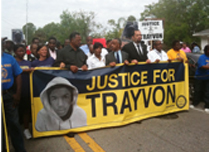AFRICAN AMERICANS KNOW THE FACTS THAT MATTER
- Details
- Category: Justice
- Published: Tuesday, 25 June 2013 00:08
- Written by Attorney Jerry Girley
 As I observed the voir dire, jury selection, process last week in the Trayvon Martin murder trial I was struck by the repeated statements of some prospective White jurors that African Americans marched in Sanford before we knew all of the facts. I do not recall a prospective African American making a similar statement. My reply to this broad brush accusation is African Americans marched in Sanford because we had enough information, as in enough is enough.
As I observed the voir dire, jury selection, process last week in the Trayvon Martin murder trial I was struck by the repeated statements of some prospective White jurors that African Americans marched in Sanford before we knew all of the facts. I do not recall a prospective African American making a similar statement. My reply to this broad brush accusation is African Americans marched in Sanford because we had enough information, as in enough is enough.
To the rest of America, Trayvon Martin’s killing and the Sanford Police Department’s, refusal to arrest George Zimmerman may have been one isolated incident. But, to many African Americans it was another disturbing stop on a three hundred and ninety four year journey of disdain, disrespect and dehumanization.
The journey began at Jamestown, Virginia in 1619, when the first African slaves were imported to this country for the purpose of creating quick wealth for the English Colonies. The US Constitution regarded African Americans as 3/5 human for Congressional apportionment purposes and in 1857 the US Supreme Court ruled in the infamous Dred Scott Case that the rights, privileges, protections and immunities of the US Constitution did not apply to African Americans. The court went to great lengths to support its despicable conclusion by listing an expansive history of how the rest of the “Civilized White world”, regarded African Americans. Strikingly, the court said the following:
They had for more than a century before been regarded as beings of an inferior order, and altogether unfit to associate with the white race either in social or political relations, and so far inferior that they had no rights which the white man was bound to respect....
Although the nation has taken quantum steps forward, with respect to the issue of race, the Dred Scott principle has demonstrated remarkable staying power. African Americans marched in Sanford, because the Sanford Police Department’s inept response to Trayvon Martin’s murder is a Twenty First Century illustration of the Dred Scott principle. That is, an African American has no rights which a White man is bound to respect. African Americans know that it is true, because we have nearly four hundred years of experience with a court system that is reluctant to recognize, let alone vindicate our rights. Yet, this same system is quick to presume the very worst about our fathers, our sons and our daughters.
Trayvon Martin’s case, as tragic as it may be, is not an anomaly to the African American experience. Rather, it is a very familiar stop along a very long and tragic journey in our search for complete freedom. The US Supreme Court’s 1896 ruling in Plessy v. Ferguson, separate but equal, is a previous stop on this journey. The 1955 brutal Killing of Emit Till in Mississippi and the acquittal of his White killers by an all White jury was another disheartening stop in this tedious journey. The 1963 murder of Mississippi Civil Rights lawyer Medgar Evers is another example and another stop. Similarly, the 1968 murder of Dr. Martin Luther King Jr. was a devastating stop in our journey. More recently, the savage beating of the late Rodney King, captured on video, and the subsequent acquittal of the officers involved, by an all White jury was yet another stop. The tandem rulings of the US Supreme Court, today, June 24, 2013, which make it far more difficult for African Americans and other minorities to successfully prosecute employment discrimination lawsuits, are brutal examples of how the federal courts have gone in the back door repeatedly and taken away the rights that Congress have given us in the form of curative civil rights legislation. This pattern has repeated itself throughout American history.
Contrary to what some may think, African Americans have a plethora of information about the facts that led to the death of Trayvon Martin. We also have enough information about how the court’s in America regard our legal issues. In short we know there has been and continues to be a negative bias toward African American litigants, African American defendants and African American victims. This treatment has created a residual fatigue, frustration and a mounting determination in the collective psyche of the African American community. African Americans marching in Sanford was about Trayvon Martin, but it was also about so much more. The marches were about the past, the present and the future implications of his death and the death of so many other African American men. That is why we marched.


